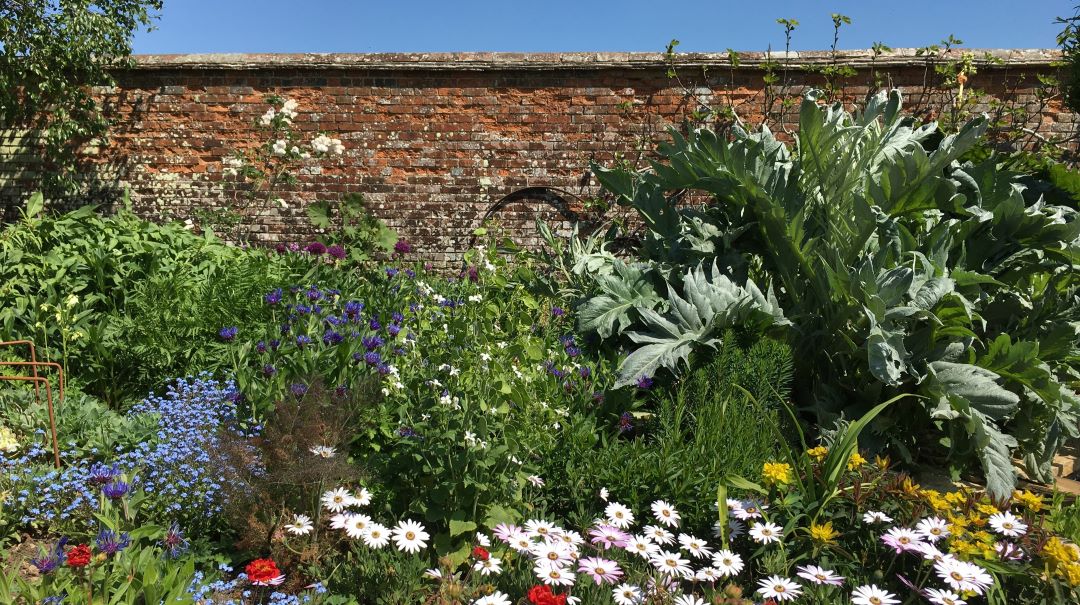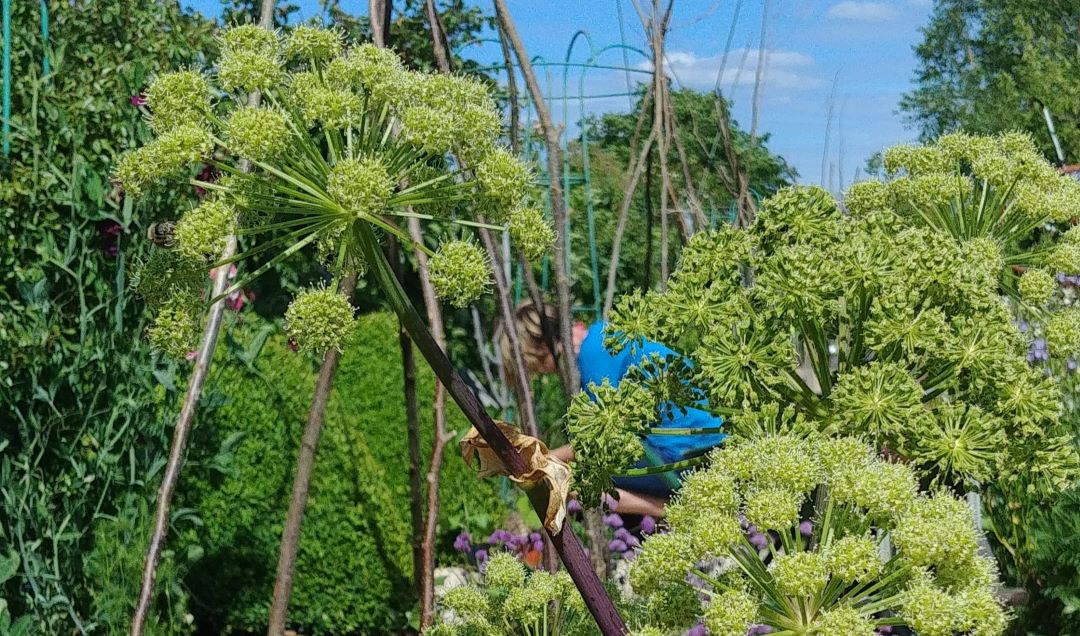
Alice Williamson
November 28, 2023
•
5 min

‘When we work with nature outside us, we work with nature inside us.’ Sue Stuart-Smith
We’re all familiar with that feeling of calm that being outside in nature brings, whether it’s strolling through a serene forest, gazing across a tranquil lake, or simply watering our garden plants. It’s as if everything you were worrying about suddenly disappears and you realise that your mind is the quietest it has been all day. Maybe you feel like you are finally able to breathe freely.
So why does nature have such a profound effect on us? Well, as Sue Stuart-Smith reminds us in her book, A Well Gardened Mind, as humans we tend to overlook the fact that we are, at heart, ‘creatures of the earth.’ In our modern world of artificial light, packaged foods and convenience stores, it’s easy to forget that we’re just as much a part of the natural world as the birds flying in the skies above us or the deer roaming the forests. The truth is our minds and bodies aren’t made for the fast-paced 24/7 lifestyle of today; they’re made for the slow and steady rhythms of nature. At our core, we are woven into the fabric of the earth.
This explains why we feel that sense of calm wash over us when we’re in nature. It’s also why experts in psychiatry are beginning to turn their attention to the benefits of ‘Green Care’. Rachel Bragg, part of the Green Care Research Team at the University of Essex, has long researched the link between nature and well-being. Her work highlights the idea that nature significantly alleviates symptoms of stress, anxiety, depression, and even more severe mental disorders.
‘Green care’ essentially refers to nature-based mental health interventions. Many doctors in the psychiatry field have recognised that by harnessing nature’s healing potential we can help alleviate many mental health conditions. Arguably, nature should be as much a part of our clinical healthcare system as CBT or prescribed medicines - part of a care plan for patients.
The truth is our minds and bodies...are made for the slow and steady rhythms of nature. At our core, we are woven into the fabric of the earth.
Some of the researched benefits of spending time in nature include mood enhancement, anxiety alleviation, enhanced cognitive function and increased social connection. The gentle, slow-paced rhythm of nature has been proven to have a calming effect on the mind; it’s an invitation to slow down.
Moments spent in nature have also been linked to improved cognitive function, attention span, memory recall and creativity. Researchers put this down to nature inducing something in us called ‘soft fascination’, a state that enables the mind to become calmer, creating space for new possibilities. It’s triggered by activities such as listening to birdsong, watching the trees sway in the wind or feeling your feet in the soil. When our physical senses are engaged, our mind stills.

Whether it’s the delicate intricacy of a spider's web or the burning colours of a sunflower, as Professor Melanie Rudd puts it, nature makes time feel ‘more expansive, more full and rich.’
In A Well Gardened Mind, Stuart-Smith reiterates the idea that nature, especially the nurturing of gardens, holds the power to heal and restore our minds. Gardens offer a sensory spa for our soul, fostering a sense of connection with the natural world. One of the earliest descriptions of a therapeutic garden dates back to the 11th century. The French monk St. Bernard of Clairvaux describes the hospice gardens at Clairvaux Abbey in France:
‘The sick man sits upon the green lawn,’ he wrote. ‘For the comfort of his pain all kinds of grass are fragrant in his nostrils…the lovely green of herb and tree nourishes his eyes…the choir of painted birds caresses his ears…the earth breathes fruitfulness, and the invalid himself with eyes, ears and nostrils, drinks in the delights of colours, songs and perfumes.’
Here, Saint Bernard paints a beautiful image of the peace that comes from stepping into nature.
Nature makes time feel "more expansive, more full and rich."
‘As we cultivate the earth, we cultivate an attitude of care towards the world.’
Sue Stuart-Smith
This quote beautifully sums up the very idea behind therapeutic horticulture. Stuart-Smith goes on to explain how, in a fast-paced, convenient world with a ‘replace’ rather than ‘repair’ attitude, the act of caring has become somewhat of a radical idea.
Despite early allusions to the healing power of nature, it wasn’t until the 18th century that the idea of therapeutic horticulture became prominent. Benjamin Rush, one of the founding fathers of the United States, was a physician with a particular interest in the healing powers of nature. While conducting research in one particular ‘mental’ asylum in the US, he discovered that patients who worked in the asylum grounds, whether that be cutting wood, digging in the garden or making fires, often made the fastest recoveries.
Clearly, there is something about working closely with the earth that facilitates healing in the body. As well as nature’s slow-pace and serenity, perhaps there is also something in the way we interact with it. Gently caring for something living can help you to learn to care for yourself.

When you dig deeper, there are also a whole host of scientific studies that back up the idea that working with the earth is so good for us. One of these relates to the aromas released when gardening. The human olfactory (smell) centre is particularly sensitive to a chemical called ‘geosmin’, released in the aroma of wet earth. Smelling it can trigger feelings of calm and safety and help us to feel grounded.
Neuroscientist Christopher Lowry also discovered that soil contains small amounts of a bacterium that can boost serotonin (happy chemicals) in the brain - another example of nature having a tangible impact on our well-being.
Some of the feelings associated with being in nature, though, can’t be put down to science. Nature has been the subject of poetry, art, and music for centuries, and our connection to it runs deep. Nature offers a peace that liberates us. In his poem ‘The Peace of Wild Things’, Wendell Berry captures this very notion.
When despair for the world grows in me
and I wake in the night at the least sound
in fear of what my life and my children’s lives may be,
I go and lie down where the wood drake
rests in his beauty on the water, and the great heron feeds.
I come into the peace of wild things
who do not tax their lives with forethought
of grief. I come into the presence of still water.
And I feel above me the day-blind stars
waiting with their light. For a time
I rest in the grace of the world, and am free.
Gently caring for something living can help you to learn to care for yourself.
In the simple act of gardening, we can see that we are able to cultivate more than just the earth, but also an attitude of care for the world and ourselves. By implementing ‘Green Care’ into mainstream medical practice, we can shift towards a more sustainable and compassionate healthcare system.
At Bridewell Gardens, we have seen this phenomenon play out for ourselves. Talking about their time spent at Bridewell, one former gardener summed up everything we aim to do beautifully:
“My time spent at the garden, I believe, was the overriding factor to recovery to which end I am eternally grateful.”
If you'd like to hear news from the gardens you can join our mailing list here